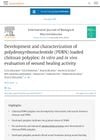
A new laser treatment may help regrow hair in men with pattern baldness and has minimal side effects.

Four natural compounds were found to promote hair growth effectively.
 November 2023 in “Brain Sciences”
November 2023 in “Brain Sciences” Some medications might contribute to male infertility, with finasteride showing a high number of reports.
October 2023 in “Applied sciences” Iris germanica rhizome-derived exosomes help protect skin cells from oxidative stress and aging.
September 2023 in “International journal of molecular sciences” Targeting lipid metabolism can help treat advanced, resistant cancers.
 September 2023 in “Irish Journal of Medical Science (1971 -)”
September 2023 in “Irish Journal of Medical Science (1971 -)” About 61% of women who had COVID-19 experienced hair loss afterward.
September 2023 in “International journal of molecular sciences” Pinus densiflora extract may help improve memory and reduce brain inflammation.
 September 2023 in “International journal of biological macromolecules”
September 2023 in “International journal of biological macromolecules” The chitosan/PDRN polyplex improved wound healing in diabetic rats.
 September 2023 in “Biomedicines”
September 2023 in “Biomedicines” Squalene may be a marker for certain types of alopecia.
 September 2023 in “Physiology and Pharmacology”
September 2023 in “Physiology and Pharmacology” Glucocorticoids can cause various health issues, but some treatments may help reduce these effects.
August 2023 in “Diagnostics” Ultra-high-frequency ultrasound effectively evaluates the impact of hyaluronic acid fillers in reducing nasolabial fold wrinkles over time.
August 2023 in “Fermentation” Scientists can use engineered microbes to make L-aspartate and related chemicals, but there's still room to improve their efficiency.

New treatments for hair loss should target eight main causes and use specific plant compounds and peptides for better results.
 July 2023 in “Pharmacognosy Magazine”
July 2023 in “Pharmacognosy Magazine” Cerasus serrulata flower extracts have strong antibacterial and antioxidant effects and may help prevent hair loss.
 July 2023 in “International Journal of Cosmetic Science”
July 2023 in “International Journal of Cosmetic Science” Biopolymers are increasingly used in cosmetics for their non-toxicity and skin benefits, with future biotech advancements likely to expand their applications.
 July 2023 in “Biomolecules”
July 2023 in “Biomolecules” The circadian clock plays a key role in hair growth and its disruption can affect hair regeneration.
 May 2023 in “Scientific Reports”
May 2023 in “Scientific Reports” The seed extract of Lepidium sativum L. can potentially treat hair loss, showing effects similar to 5% minoxidil.
 April 2023 in “Dermatologica Sinica”
April 2023 in “Dermatologica Sinica” Sex hormones affect hair growth and loss, and treatments for related hair diseases include various medications, hair transplantation, and light therapy.

The study concludes that long COVID recovery involves time, various treatments, and a strong patient-provider relationship.
 March 2023 in “Biomedicine & Pharmacotherapy”
March 2023 in “Biomedicine & Pharmacotherapy” GPR40 agonists help hair growth through the protein ANGPTL4.
 January 2023 in “IntechOpen eBooks”
January 2023 in “IntechOpen eBooks” The document concludes that specific methods for making diazine-based drugs can lead to high yields and are important for creating effective treatments for various diseases.
 January 2023 in “Biomaterials Science”
January 2023 in “Biomaterials Science” Certain genes are more active during wound healing in axolotl and Acomys, which could help develop materials that improve human wound healing and regeneration.
September 2022 in “Cosmetics” October 2021 in “Case Reports in Veterinary Medicine” The dog died from myxedema coma linked to severe atherosclerosis and thyroid issues.
July 2021 in “Anais brasileiros de dermatologia/Anais Brasileiros de Dermatologia” Monilethrix causes different levels of hair loss in family members.
March 2021 in “Juniper Online Journal Material Science” Energy healing treatment improved L-cysteine's stability, solubility, bioavailability, and shelf-life.
 December 2020 in “Biomedical Journal of Scientific and Technical Research”
December 2020 in “Biomedical Journal of Scientific and Technical Research” Serenoa repens, a natural compound, can increase hair count and help repair capillaries, making it a promising treatment for hair loss.
January 2019 in “Springer eBooks” Sebaceous glands play a key role in skin health and conditions like acne.
January 2018 in “Journal of human virology & retrovirology” Lifestyle drugs are mainly used by wealthy people in India but could spread to others, affecting society and youth.
Diphenyl cresyl phosphate has low toxicity but can harm the liver, kidneys, adrenal glands, and testicles at high doses.


















